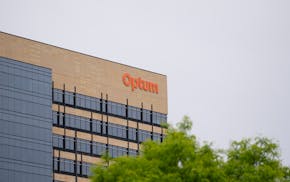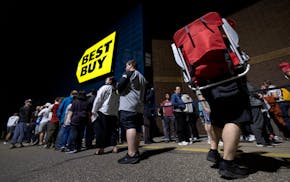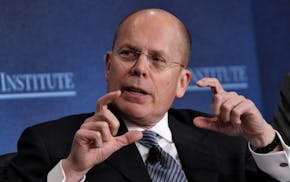It was yet again a busy day at the Osborn370 building in downtown St. Paul.
Commercial kitchen repair and maintenance company Smart Care was celebrating its first year in business with desserts and drinks on one of the top floors. A few floors below, the mayor had popped in to christen the offices of KLJ Engineering.
"It's 4:30 on Thursday. That must mean it's time for another ribbon-cutting at Osborn370," Mayor Melvin Carter said at the event, according to a tweet.
The property has come nearly full circle since it was first purchased more than a year ago and renovations began. The Osborn370 project signaled a jump in private investment in downtown St. Paul, a market that has suffered from a lack of modern, high-quality office space.
"Osborn370 is our IDS Center," said Tanya Bell, co-founder of Grand Real Estate Advisors Group, one of the partners of the development, referring to the iconic skyscraper in downtown Minneapolis. "This is a well-built headquarters building."
So far in 2018, businesses, including a cohort of startups led by a diverse roster of entrepreneurs, have moved into the Osborn. Just last month, the Beaningful Coffee shop, a social enterprise run by nonprofit Neighborhood House, and a branch of Bridgewater Bank opened in the lobby and the YMCA announced it may move its downtown gym to the building. In the next couple of months, a Bridgewater Bank sign will replace the Ecolab name that has long adorned the top of the 20-story structure.
"We are trying to make sure that St. Paul is one of the places where [companies] can grow up," said Scott Burns, one of the Osborn's investors and co-founder of software firm Structural.
A big component of the vision for the Osborn has been its "flex floor," which allows for one- to 10-person organizations to enter short-term leases for space.
"When we sort of originally thought about what was missing in St. Paul and what the strategic opportunity would be we talked about … flexibility, you have to have different entry points and different ways to grow in a structure for it to maintain clients over time," Burns said. The Structural firm as well as the Knight Foundation, Paul Davis Restoration, Riverpoint Investments and software company OppSource are all on the flex floor.
Still, there's a long way to go. The building is about 65 percent full, leaving floors of vacant space available. In St. Paul, as in Minneapolis, a large inventory of available office space exists in multitenant buildings as companies consolidate or choose to move into their own buildings.
While Osborn stakeholders are excited that the building has become a hub for Twin Cities startups, they stress that Osborn is a good place for established companies as well.
St. Paul has struggled with its aging office buildings, and considerable office space has been converted into apartments and other uses in the last decade. According to an October report, downtown St. Paul competitive offices had a vacancy rate of 19.1 percent, down from 20.8 percent around the same time last year. However, the Greater St. Paul Building Owners and Managers Association (BOMA), which compiled the report, noted that much of the drop in vacancy was due to office conversions.
In summer 2017, a group of investors led by PAK Properties, which is owned by developer Rich Pakonen, bought what's now the Osborn370 for $3.6 million. The building located at 370 Wabasha St. had been the headquarters for Ecolab before the company shifted its offices to the nearby former Travelers Cos. tower. The new owners renamed the former Ecolab offices Osborn370 as a nod to the street address and Ecolab founder Merritt J. Osborn.
The group has invested $20 million to redevelop the property. Construction of public spaces in the building is nearly complete with a new community floor that opened over the summer and enhancements to the lobby.
Historically the building, which is connected via the skyway on the ground floor, had mostly only been accessible to Ecolab staff, said Ted Davis, a communications consultant to Osborn370. The dynamic of the building has changed, he said.
"The public can just walk right in and buy a cup of coffee," Davis said. "They can bank. They can go visit with one of the many tenants that's here."
St. Paul has recently seen an uptick in developers interested in office projects. The 428, the former Woolworth store on the corner of Minnesota Street and 7th Place, opened this summer as one of the few speculative office buildings in the Twin Cities. In October, the Ackerberg Group was approved as the developer of the public safety annex building at E. 10th and Robert streets. Plans call for it to be renovated into modern office and retail space.
Burns said it helps the Osborn when other projects like the 428 are successful.
"We need to continue to make sure that St. Paul is in a great position," he said.
Nicole Norfleet • 612-673-4495
Neal St. Anthony • 612-673-7144

UnitedHealth sues the Guardian, alleging defamation in coverage of nursing home care

Prices for international flights drop as major airlines navigate choppy economic climate
Minnesota's med spa industry rises in popularity — and with little regulation

Hundreds line up at Best Buy to nab Nintendo Switch 2, in scene like '90s opening parties
